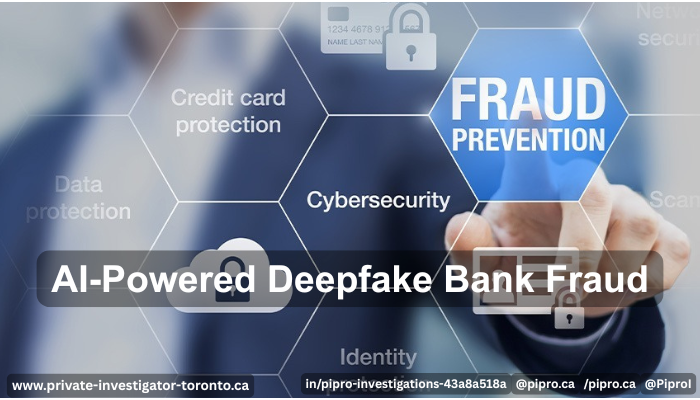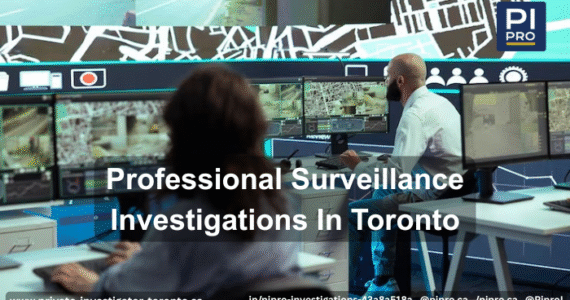
AI-Powered Deepfake Bank Fraud
What is AI-Powered Deepfake Bank Fraud?
This is more so evident when looking at the kinds of scams being conducted by artificial intelligence in the year 2025. Of them all, the deepfake bank fraud is unique in this aspect because not only is it credible, but it can also be carried out quickly. Thieves are also using artificial intelligence to mimic voices and faces in an attempt to intrude different organizations and gain the position of CEOs, executives, or members of the family.
In this Scam of the Week post, we explore this worrying trend, how it operates, who is being targeted and in a positive note, how private investigators can assist in preventing the practice.
How These Scams Are Carried Out
In this part, details on how these scams are perpetrated are provided:
Step 1: Data Mining
Productivity is the collection of video and audio compilations from social media apps like LinkedIn, YouTube, and TikTok. Surprisingly, short videos are also quite effective for training AI models.
Step 2: Deepfake Creation
They employ other tools such as ElevenLabs, DeepFaceLab, or Synthesia together with a target person or organization’s recordings to develop fake audio or video imitations.
Step 3: The Scam Execution
Typically, they imitate the client such as a corporate executive or an account holder and in a telephonic conversation, video conference, VOIP call or a text conversation including voice chats, they ask the wire transfer or control over the account.
Step 4: Vanishing Act
This is because, after transferring the funds, the criminals cash out the money through wallets or accounts, resulting in almost impossible recovery.
Real-World Deepfake Scam Cases
-
$25 Million Hong Kong Fraud (2024)
A finance worker was told by a deepfake Zoom call where the scam artist impersonated his boss, the company’s CFO, and other executives in the firm to transfer $25 million. The scam, however, was only uncovered days after that.
-
UK Banking Scam
Furthermore, there is another feature of the new AI technology related to the financial sector; a UK bank’s employee recently had a call with a fraudulent “client” which his voice was cloned by the new AI system. This was a transaction request which looked genuine and cost the bank £ 300, 3OO.
These are just a few examples of techniques described in the Scam of the Week posts around the world. All these crimes indicate can be attributed to the emergence of this new form of fraud in financial systems.
Why Private Investigators Are Essential in 2025
This article looks at the necessity of private investigators in the society by analysing their relevance in the year 2025. It is quite easy to believe that deepfake scams are not worth bothering however, that is not the case. Cyber scammers practice schemes where they defraud their targets, alter data, and disappear, and PIs supplement their ‘proper’ investigation skills with cyber forensics to counter them.
-
Voice and Video Forensics
Even if the loop has been shortened, for example, if two minutes have been cut down to 20 seconds, trained PIs with access to forensic tools can easily notice a difference that makes the video appear fake.
-
IP and Metadata Tracing
The authorities are able to identify the source of deceptive messages through the Internet protocol addresses, the details of the sent emails or concealed electronic transactions the technology of the blocks.
-
Liaison with Law Enforcement
Since deepfake fraud is transnational in nature, PIs can work in collaboration with both local police and cybersecurity teams to arrest the culprits.
-
Risk Assessments for Businesses
PIs also get contracted to audit for fraud risk in organizations, emulating previous scenarios which would be carried out by fraudsters, especially in such industries such as financial and legal industries.
Who Is Being Targeted?
This latest scam is not only limited to companies and businesses. Hey kids, using apps to be dishonest and fool everyone, including high net worth individuals, lawyers and so-called tech-savies geeks. Targets often include:
- Chiefs of staffs in large organizations
- Small business owners
- Lawyers and estate planners
- Retirees with public investment portfolios
- Crypto investors and influencers
If you are not a millionaire or a celebrity, but you have an active ID on the internet, it can be used as a weapon.
Signs You May Be Dealing with a Deepfake
It has become relatively easy to tell when people are lying to us, especially with the advancement of technology and the creation of so many different deepfake videos and images out there today, here are the signs that one may be using a deep fake image.
But here are the warning signals that you shouldn’t ignore:
- Voice calls with a small delay and/or a robotic quality
- Appearance of blinking lights or odd motion of the eyes during video conferencing
- Many clients make requests for urgency while not allowing enough time for the verifier to verify the information as accurately.
- These are calls from parties that I know or recognize, but receive calls or messages from unknown numbers or web addresses
- They do not answer another type of call, such as email, or turning down a call when they have emailed.
Effective ways on how to protect yourself
-
Multi-Layered Authentication
Do not underestimate the use of voice and video identification on their own. This means using emails to verify the account, personal security questions and answers, and 2 Factor Authentications (2FA).
-
Private Keywords or Phrases
Develop passwords with key contact persons that instantly ascertain the identity of the person.
-
Limit Public Content
Discard filming too many videos or recording many audios that could be wise replica by the scammers. Keep personal content private.
-
Conduct Deepfake Awareness Training
The management should also ensure that its staff are well equipped to identify deepfake content and social engineering processes.
What to Do If You’ve Been Scammed
If you think you have fallen for deepfake scam:
1. Stop all transactions immediately.
2. Contact your bank of operation and report the issue as a case of fraud.
3. Engage the services of a private person to track the communication channels and assisting in gathering some evidence.
4. Inform the relevant cyber crime agency in your country, for example FIA Cyber Crime in Pakistan, Action Fraud UK, IC3 in USA.
5. It sounds quite obvious, but the prompter you are to act, the higher your chances of recovering your money or preventing more losses.
Conclusion
But what might still be shocking is that AI is not only changing businesses but also how scams happen. The bank frauds, profiled in the current Scam of the Week are examples of how dangerous and real deepfake is and why cyber-security and personal identity protection should not be underestimated. In general, if you are a business owner or CEO of a large company, or simply a concerned parent, hiring a licensed private investigator can be your first line of defence. Their methods ranging from fraud verification to forensic makes their tools and services provide security in this unreliable generation.
For more information or if you think you may have been compromised, please contact our investigative analysts for a free consultation.




